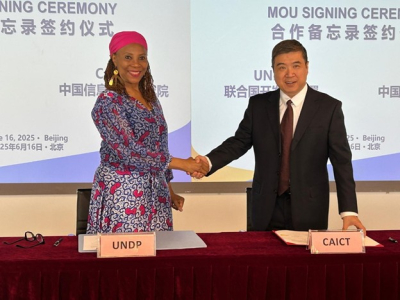
UNDP, China to Launch Africa Digital Empowerment and Innovation Hub
While digital transformation is globally acknowledged as a catalyst for sustainable development, Africa still lags in foundational digital infrastructure and skills. This initiative reflects a broader push to harness digital technology for the advancement of the continent.
The United Nations Development Programme (UNDP) and the China Academy of Information and Communications Technology (CAICT), a research institute and think tank in China, have signed a Memorandum of Understanding (MoU) to co-develop the Africa Digital Empowerment and Innovation Hub. This initiative, signed June 16, aims to accelerate digital transformation in Africa.
The agreement was formalized on the sidelines of the 4th China-Africa Economic and Trade Expo, highlighting a shared vision to leverage technology for long-term development impact.
“This partnership with CAICT is a bold step toward realizing Africa’s digital future. By combining UNDP’s development expertise with CAICT’s technological leadership, we are laying the foundation for people-centered digital transformation aligned with the Sustainable Development Goals,” said Ahunna Eziakonwa, Assistant UN Secretary General and Director of the UNDP Regional Bureau for Africa.
The Hub will serve as a collaborative platform for co-creating open-source digital solutions, strengthening institutional and human capacities, and fostering South-South cooperation. It aims to modernize Africa’s digital infrastructure by leveraging digital public goods, local innovations, and emerging technologies.
CAICT Vice President Li Guanyu described the agreement as a milestone in efforts to advance inclusive digital innovation, stating, “We are excited to partner with UNDP to drive digital progress in Africa. This MoU marks a significant milestone in our efforts to leverage technology for inclusive growth and development.”
The Hub will prioritize training programs for youth, women, and government actors in areas including artificial intelligence, cloud computing, cybersecurity, and digital governance. It will also support the development of Digital Public Infrastructure (DPI), empowering startups and entrepreneurs to scale high-impact solutions across health, education, agriculture, and green energy sectors.
In addition to skill-building, the platform will promote cross-border collaboration between African and Chinese enterprises through innovation accelerators, mentorship schemes, and investment dialogues, reinforcing economic ties while championing inclusive innovation.
The World Bank estimates that over 230 million jobs in sub-Saharan Africa will require digital skills by 2030, yet current education and training systems fall short of meeting this demand. This growing demand for digital skills underscores an urgent need to reform and expand Africa’s digital education and training systems. Without timely intervention, millions of young Africans risk being excluded from the future workforce, deepening unemployment and inequality across the continent. Initiatives like the Africa Digital Empowerment and Innovation Hub are therefore critical, not just for economic competitiveness, but for ensuring that Africa’s youth are equipped to thrive in a digitally-driven global economy.
Hikmatu Bilali

